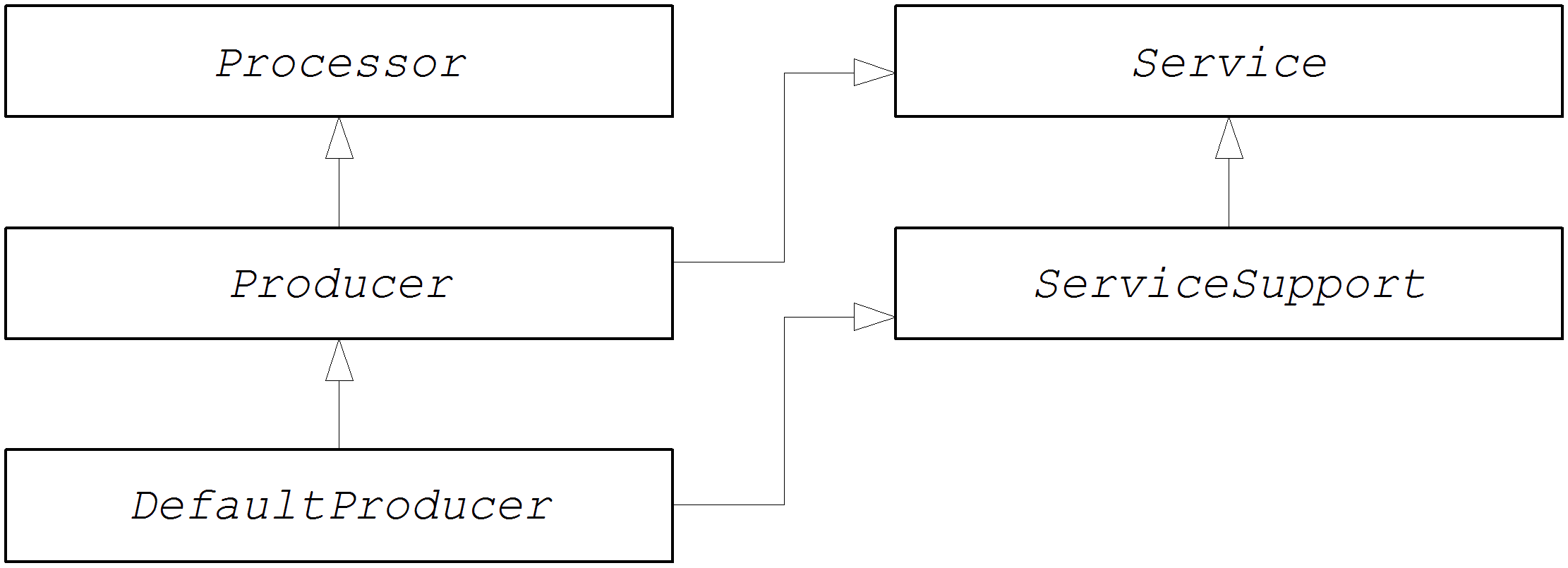An instance of org.apache.camel.Producer type represents
a target endpoint in a route. The role of the producer is to send requests
(In messages) to a specific physical endpoint and to receive the
corresponding response (Out or Fault message). A
Producer object is essentially a special kind of Processor that
appears at the end of a processor chain (equivalent to a route). Figure 9.1 shows the inheritance hierarchy for
producers.
Example 9.1 shows the definition of the
org.apache.camel.Producer interface.
Example 9.1. Producer Interface
package org.apache.camel;
public interface Producer extends Processor, Service, IsSingleton {
Endpoint<E> getEndpoint();
Exchange createExchange();
Exchange createExchange(ExchangePattern pattern);
Exchange createExchange(E exchange);
}The Producer interface defines the following
methods:
process()(inherited from Processor)—The most important method. A producer is essentially a special type of processor that sends a request to an endpoint, instead of forwarding the exchange object to another processor. By overriding theprocess()method, you define how the producer sends and receives messages to and from the relevant endpoint.getEndpoint()—Returns a reference to the parent endpoint instance.createExchange()—These overloaded methods are analogous to the corresponding methods defined in theEndpointinterface. Normally, these methods delegate to the corresponding methods defined on the parentEndpointinstance (this is what theDefaultEndpointclass does by default). Occasionally, you might need to override these methods.
Processing an exchange object in a producer—which usually involves sending a
message to a remote destination and waiting for a reply—can potentially block for a
significant length of time. If you want to avoid blocking the current thread, you can opt to
implement the producer as an asynchronous processor. The asynchronous
processing pattern decouples the preceding processor from the producer, so that the
process() method returns without delay. See Asynchronous Processing.
When implementing a producer, you
can support the asynchronous processing model by implementing the
org.apache.camel.AsyncProcessor interface. On its own, this
is not enough to ensure that the asynchronous processing model will be used: it is also
necessary for the preceding processor in the chain to call the asynchronous version of the
process() method. The definition of the
AsyncProcessor interface is shown in Example 9.2.
Example 9.2. AsyncProcessor Interface
package org.apache.camel;
public interface AsyncProcessor extends Processor {
boolean process(Exchange exchange, AsyncCallback callback);
}The asynchronous version of the process() method
takes an extra argument, callback, of
org.apache.camel.AsyncCallback type. The corresponding
AsyncCallback interface is defined as shown in Example 9.3.
Example 9.3. AsyncCallback Interface
package org.apache.camel;
public interface AsyncCallback {
void done(boolean doneSynchronously);
}The caller of AsyncProcessor.process() must provide
an implementation of AsyncCallback to receive the
notification that processing has finished. The AsyncCallback.done()
method takes a boolean argument that indicates whether the processing was performed
synchronously or not. Normally, the flag would be false, to indicate
asynchronous processing. In some cases, however, it can make sense for the producer
not to process asynchronously (in spite of being asked to do so). For
example, if the producer knows that the processing of the exchange will complete rapidly, it
could optimise the processing by doing it synchronously. In this case, the
doneSynchronously flag should be set to
true.
When implementing a producer, you might find it helpful to call some of the methods in
the org.apache.camel.util.ExchangeHelper utility class. For full
details of the ExchangeHelper class, see The ExchangeHelper Class.









